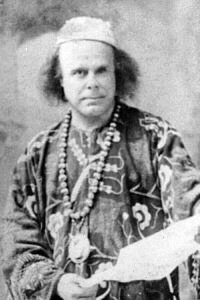
THE D'OYLY CARTE OPERA COMPANY
 |
| Sydney Paxton as Sirocco in The Lucky Star |
Sydney Paxton (1899)
[Born London 25 Jun 1860, died New York City 13 Oct 1930]
In a fifty-year career as an actor Sydney Oughton Paxton Hood had but six weeks with the D'Oyly Carte Opera Company.
Sydney Paxton made his first stage appearance in 1880 at Cambridge Hall, Southport. He toured for seven years with Edward Compton (1885-92), and in 1894 joined W. S. Penley at the Globe, playing Spettigue in Charley's Aunt over a thousand times. Paxton spent the better part of his career in London. He also served for a time as theatre manager and business manager. He came to America in 1912 to appear in Fanny's First Play, but returned to England shortly thereafter. His last appearance in London was in 1923, but he returned to America the following year where he performed on stage until 1928, making his last appearance as James in The Great Necker at the Ambassador in 1928. He reportedly devoted his later years to motion pictures.
Paxton was the Hon. Secretary of the Actors Association for twelve months (1917-18), and was instrumental in forming the Actors' Union in England. He served on the Executive Committee of the Actors' Benevolent Fund for many years.
In 1917 Sydney Paxton published his reminiscences, "Stage See-Saws; or The Ups and Downs of an Actors' Life" (London, Mills & Boon, Ltd.). Paxton candidly describes his engagement with D'Oyly Carte Opera Company at the Savoy as one of bitter disappointment. He had been introduced to Mrs. D'Oyly Carte through Walter Passmore, and engaged for what he'd hoped would be a suitable role (Sirocco) in a new work that turned out to be The Lucky Star. It opened at the Savoy on January 7, 1899. Paxton later wrote: "When it had been running for about six weeks, I had a most considerate and kindly letter from Mrs. Carte, to say that they hoped to improve it by recasting my part of Sirocco. I was deeply hurt and disappointed!! It was a bitter blow, after my hopes and expectations. I derived some consolation from the fact that I continued to receive a good salary, though I didn't work for it; but my greatest consolation was that my successor, an important musical comedy artiste [Fred Wright, Jr.], didn't do any better in the part than I had done, and The Lucky Star soon came to an untimely finish."
Although disappointed by Mrs. Carte's decision, Paxton never blamed her personally. She was: "A wonderful business woman, kind, generous, and considerate, and after I had left, although a failure, she always treated me as though I had been a success."
P-Q Index | "Who Was Who" Homepage
| Page modified July 9, 2002 | © 2001-02 David Stone |